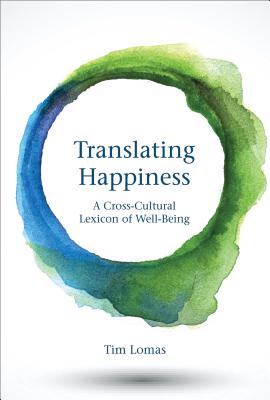Translating Happiness: A Cross-Cultural Lexicon of Well-Being

Translating Happiness: A Cross-Cultural Lexicon of Well-Being
How embracing untranslatable terms for well-being--from the Finnish sisu to the Yiddish mensch--can enrich our emotional understanding and experience.
Western psychology is rooted in the philosophies and epistemologies of Western culture. But what of concepts and insights from outside this frame of reference? Certain terms not easily translatable into English--for example, nirva?a (from Sanskrit), or ag pe (from Classical Greek), or turangawaewae (from Maori)--are rich with meaning but largely unavailable to English-speaking students and seekers of wellbeing. In this book, Tim Lomas argues that engaging with "untranslatable" terms related to well-being can enrich not only our understanding but also our experience. We can use these words, Lomas suggests, to understand and express feelings and experiences that were previously inexpressible.
Lomas examines 400 words from 80 languages, arranges them thematically, and develops a theoretical framework that highlights the varied dimensions of well-being and traces the connections between them. He identifies three basic dimensions of well-being--feelings, relationships, and personal development--and then explores each in turn through untranslatable words. nanda, for example, usually translated as bliss, can have spiritual associations in Buddhist and Hindu contexts; kefi in Greek expresses an intense emotional state--often made more intense by alcohol. The Japanese concept of koi no yokan means a premonition or presentiment of love, capturing the elusive and vertiginous feeling of being about to fall for someone, imbued with melancholy and uncertainty; the Yiddish term mensch has been borrowed from its Judaic and religious connotations to describe an all-around good human being; and Finnish offers sisu--inner determination in the face of adversity.
Expanding the lexicon of well-being in this way showcases the richness of cultural diversity while reminding us powerfully of our common humanity. Lomas's website, www.drtimlomas.com/lexicography, allows interested readers to contribute their own words and interpretations.
PRP: 101.86 Lei
Acesta este Pretul Recomandat de Producator. Pretul de vanzare al produsului este afisat mai jos.
91.67Lei
91.67Lei
101.86 LeiIndisponibil
Descrierea produsului
How embracing untranslatable terms for well-being--from the Finnish sisu to the Yiddish mensch--can enrich our emotional understanding and experience.
Western psychology is rooted in the philosophies and epistemologies of Western culture. But what of concepts and insights from outside this frame of reference? Certain terms not easily translatable into English--for example, nirva?a (from Sanskrit), or ag pe (from Classical Greek), or turangawaewae (from Maori)--are rich with meaning but largely unavailable to English-speaking students and seekers of wellbeing. In this book, Tim Lomas argues that engaging with "untranslatable" terms related to well-being can enrich not only our understanding but also our experience. We can use these words, Lomas suggests, to understand and express feelings and experiences that were previously inexpressible.
Lomas examines 400 words from 80 languages, arranges them thematically, and develops a theoretical framework that highlights the varied dimensions of well-being and traces the connections between them. He identifies three basic dimensions of well-being--feelings, relationships, and personal development--and then explores each in turn through untranslatable words. nanda, for example, usually translated as bliss, can have spiritual associations in Buddhist and Hindu contexts; kefi in Greek expresses an intense emotional state--often made more intense by alcohol. The Japanese concept of koi no yokan means a premonition or presentiment of love, capturing the elusive and vertiginous feeling of being about to fall for someone, imbued with melancholy and uncertainty; the Yiddish term mensch has been borrowed from its Judaic and religious connotations to describe an all-around good human being; and Finnish offers sisu--inner determination in the face of adversity.
Expanding the lexicon of well-being in this way showcases the richness of cultural diversity while reminding us powerfully of our common humanity. Lomas's website, www.drtimlomas.com/lexicography, allows interested readers to contribute their own words and interpretations.
Detaliile produsului









